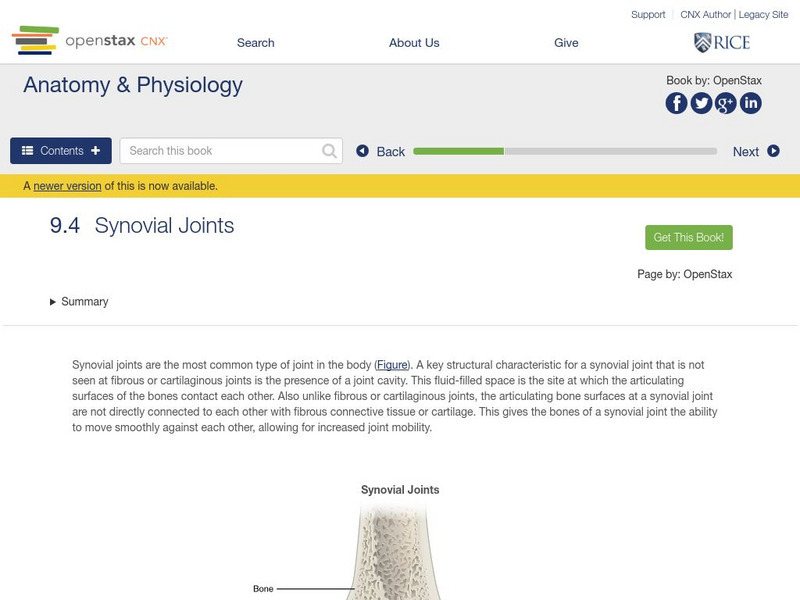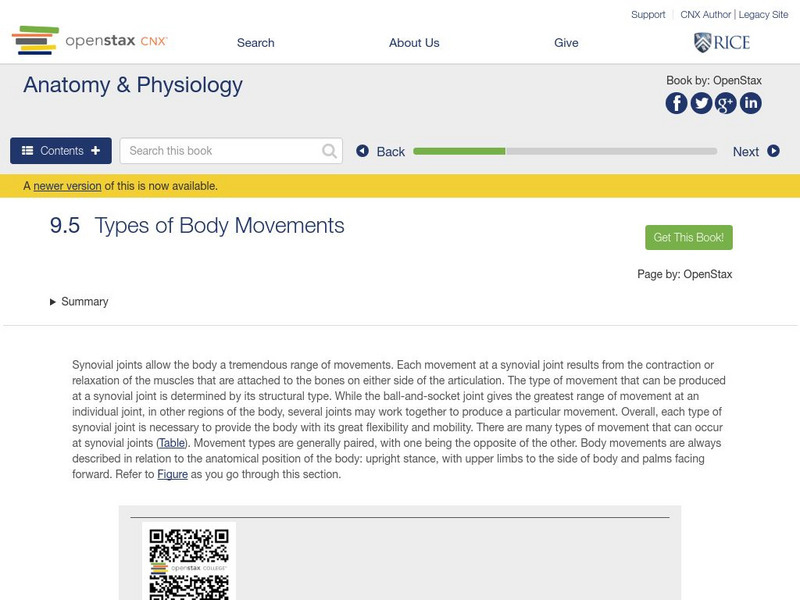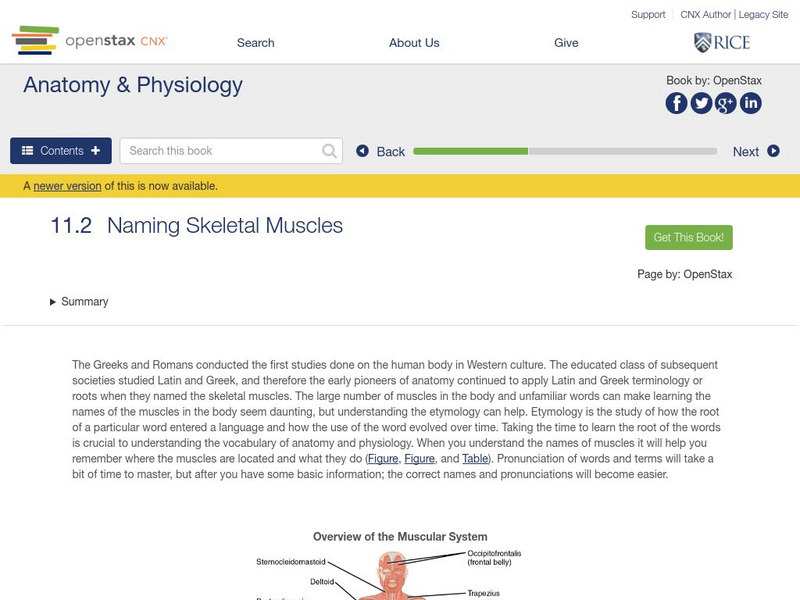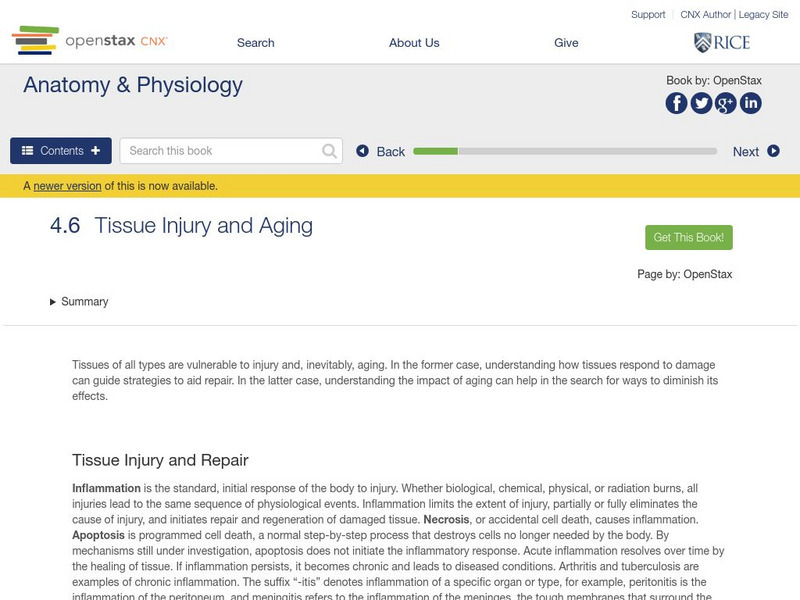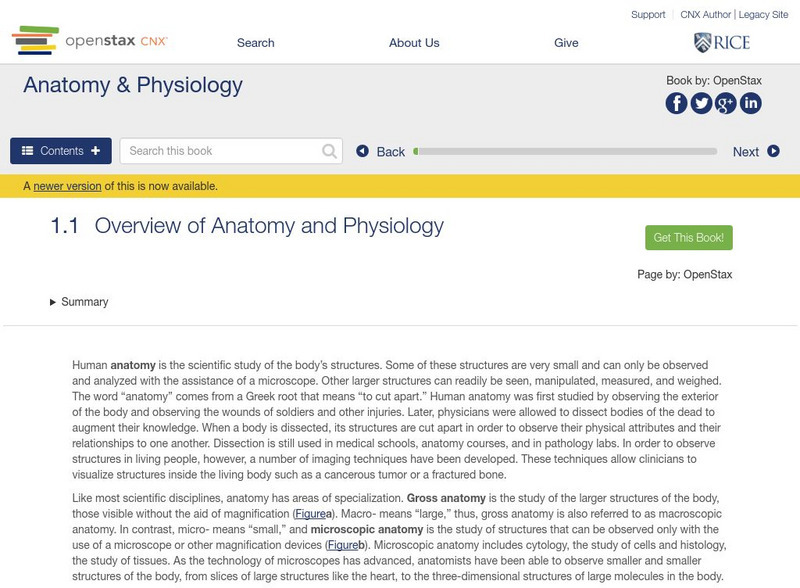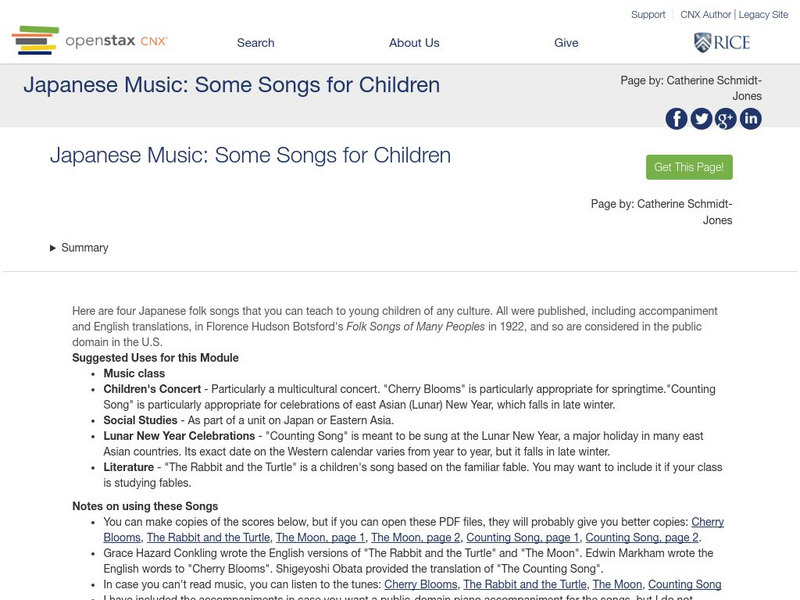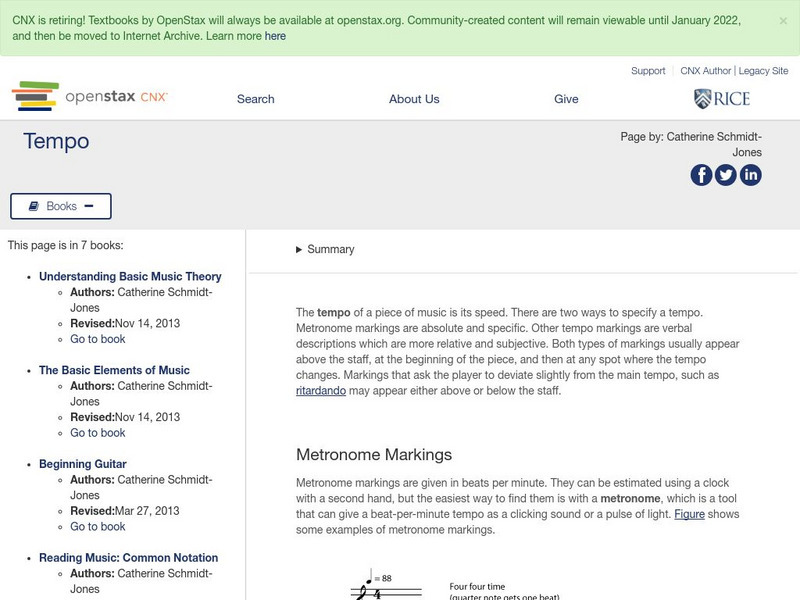OpenStax
Open Stax: Cartilaginous Joints
This site provides information regarding cartilaginous joints, joints where adjacent bones are united by cartilage.
OpenStax
Open Stax: Synovial Joints
The following site provides information regarding synovial joints, the most common type of joint in the body.
OpenStax
Open Stax: Types of Body Movement
This site provides information regarding types of body movement. Movement types are generally paired, with one being the opposite of the other. Body movements are always described in relation to the anatomical position of the body:...
OpenStax
Open Stax: Skeletal Muscle
This site includes information about skeletal muscles, of which the best-known feature is its ability to contract and cause movement.
OpenStax
Open Stax: Muscle Fiber Contraction and Relaxation
This site provides young learners with information regarding muscle fiber contraction and relaxation.
OpenStax
Open Stax: Exercise and Muscle Performance
Physical training alters the appearance of skeletal muscles and can produce changes in muscle performance. Conversely, a lack of use can result in decreased performance and muscle appearance. This site helps students understand exercise...
OpenStax
Open Stax: Smooth Muscle
This site provides an explanation of smooth muscle, muscle that is present in the walls of hollow organs like the urinary bladder, uterus, stomach, intestines, and in the walls of passageways, such as the arteries and veins of the...
OpenStax
Open Stax: Interactions of Skeletal Muscles
This site rpovides information regarding the interactions of skeletal muscles, including their fascicle arrangement and their lever systems.
OpenStax
Open Stax: Naming Muscles
This site helps you understand where muscles get their names. When you understand the names of muscles it will help you remember where the muscles are located and what they do
OpenStax
Open Stax: Muscles of the Pectoral Girdle and Upper Limbs
This site provides interactive information regarding the muscles of the pectoral girdle and upper limbs.
OpenStax
Open Stax: Tissue Injury and Aging
Tissues of all types are vulnerable to injury and, inevitably, aging. Understanding how tissues respond to damage can guide strategies to aid repair. Also understanding the impact of aging can help in the search for ways to diminish its...
OpenStax
Open Stax: Overview of Human Anatomy and Physiology
This site provides an overview of human anatomy, the scientific study of the body's structures. It also includes an overview of human physiology, he scientific study of the chemistry and physics of the structures of the body and the ways...
OpenStax
Open Stax: Anatomy & Physiology: The Peripheral Nervous System
Describe the structures found in the peripheral nervous system and the functions of those parts in the human body.
OpenStax
Open Stax: New Century, Old Disputes
As the United States entered the twenty-first century, old disputes continued to rear their heads. Some revolved around what it meant to be American and the rights to full citizenship. Others arose from religious conservatism and the...
OpenStax
Open Stax: Japanese Music: Some Songs for Children
Teach your students four Japanese songs. They will enjoy learning to sing these songs. It also includes suggestions on how to use these songs for interdisciplinary units.
OpenStax
Open Stax: Hope and Change
In 2008, American voters, tired of war and dispirited by the economic downturn, elected a relative newcomer to the political scene who inspired them and made them believe that the United States could rise above political partisanship....
OpenStax
Open Stax: Catherine Schmidt Jones: Listen to Balinese Gamelan: Beginner's Guide
A music-theory-type introduction to the gamelan music of Bali, Indonesia.
OpenStax
Open Stax: Catherine Schmidt Jones: A Guide to Great Home Music Practice
Offering good tips on practicing, this site goes into some detail on how to best use your practice time.
OpenStax
Open Stax: Catherine Schmidt Jones: Triads
Learn about triads in this well explained lesson. This site explains the root, first inversion and second inversion of the chords. Test your knowledge with several self checking problems.
OpenStax
Open Stax: Anthony Brandt: Musical Forms
Presented in this web page is a great lesson on determining musical form. Comparing musical form to a city and its neighborhoods, this site provides insightful information. Also included are several self checking problems to see if you...
OpenStax
Open Stax: Catherine Schmidt Jones: Naming Triads
Learn about the various types of triads. This lesson focuses on the chords in root position. Included in this site are a few self checking tests.
OpenStax
Open Stax: Catherine Schmidt Jones: Message Drums
How did various cultures communicate before the invention of the telephone, email or telegraph? Discover the use of message drums in this lesson plan.
OpenStax
Open Stax: Catherine Schmidt Jones: Tempo
Here is a basic introduction to the meaning of tempo. Included are various terms for tempo with a self checking quiz.
OpenStax
Open Stax: Catherine Schmidt Jones: Modes and Ragas: More Than Just a Scale
Discussed on this web page are examples of several modes and ragas. You will learn modes ranging from the classical Greek modes to the Indian ragas.



